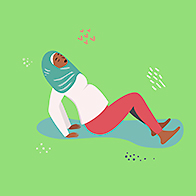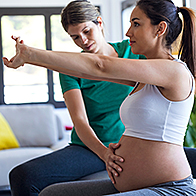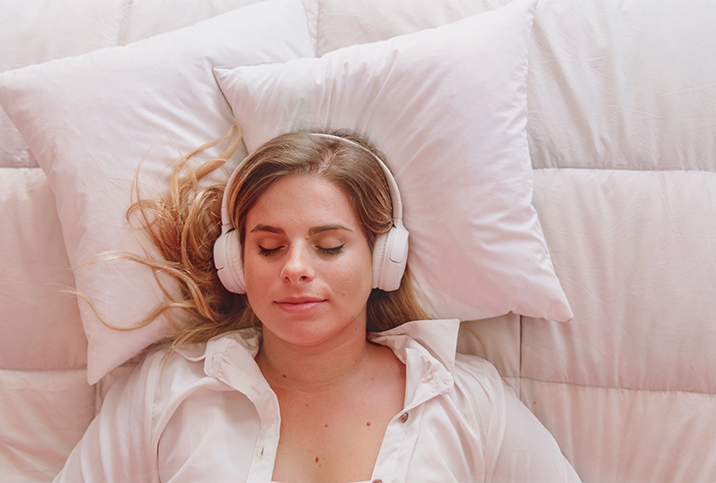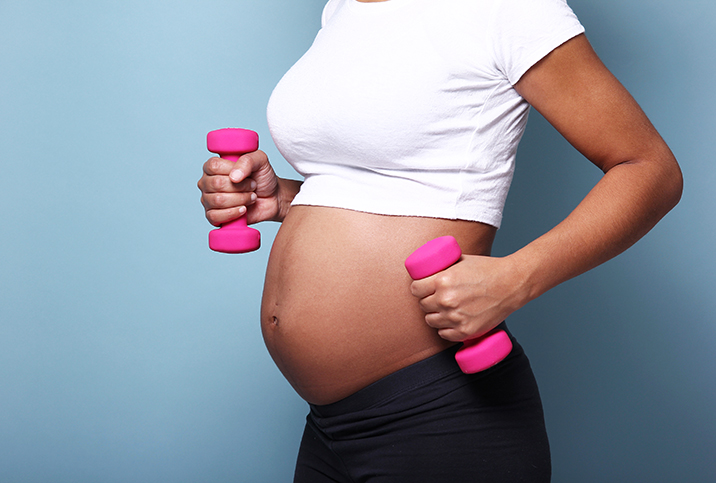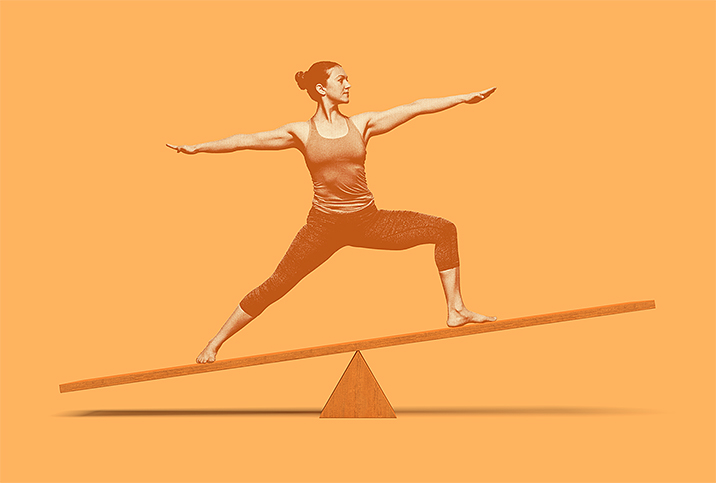Pregnancy Yoga Can Benefit You and Your Baby
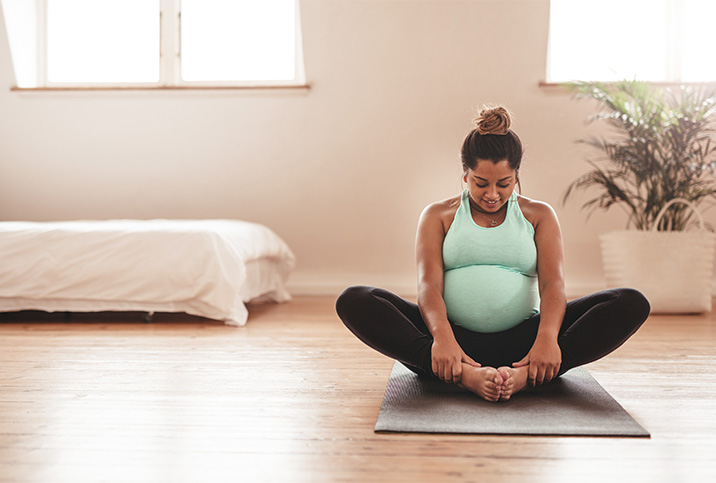
Pregnancy is a unique time in life, both wonderful and stressful. There's a lot going on when you are making a baby: Being pregnant puts the same toll on the body as running a daily marathon, according to a 2019 study published in the journal Science Advances. Mentally and physically, you're adjusting to a big life change and likely suffering symptoms such as nausea, pain, fluctuating mood and more.
Wouldn't it be nice if there was something that could help you navigate pregnancy, look after your mind and body, and benefit your baby? Turns out you might not need to look farther than your yoga mat.
Pregnancy yoga can help you manage the physical impacts of being pregnant as well as teach you breathwork and relaxation techniques that are useful during pregnancy and birth.
The benefits of yoga
Mary Jacobson, M.D., an OB-GYN in California and chief medical officer of Alpha Medical, an online doctor's office, said while the scientific literature to support yoga in pregnancy is limited, the practice can be beneficial.
"Prenatal yoga practice may benefit pregnant people who suffer from anxiety, depression, stress, low back pain and sleep disturbances," she said.
While yoga is not listed explicitly, the American College of Obstetricians and Gynecologists (ACOG) has extensively studied related forms of exercise during pregnancy including stretching and resistance exercises. Physical activity and exercise during pregnancy have been shown to benefit most people, with minimal risks.
Being pregnant puts the same toll on the body as running a daily marathon, according to a 2019 study published in the journal Science Advances.
"In general, women who exercise during pregnancy have decreased risks of gestational diabetes mellitus, cesarean birth and operative vaginal delivery, and a shorter postpartum recovery time," Jacobson said.
Yoga can help encourage more movement during pregnancy.
"As humans, we have lost some of our instinct for movement, becoming more sedentary," said Amy Davis, a pregnancy yoga teacher based in the United Kingdom. "Yoga gives us a chance to move, and because pregnancy and birth are some of the most instinct-led times in life, practicing during pregnancy can be even more helpful."
Yoga isn't a substitute for birthing classes or hypnobirthing, but there is crossover and it might help you prepare for birth. Yoga helps increase awareness of the pelvic floor, and practicing breathwork can also be helpful, Davis said.
"We breathe all the time but don't often think about it," Davis said. "You can cultivate awareness of your breath during yoga and practice so it becomes a natural go-to, which can be useful when it comes to giving birth."
Do you need a specialist class?
If you already have a strong yoga practice before pregnancy, you might be able to stick with your usual class, however, you may need to modify it.
"Modification to exercise routines may be necessary because of normal anatomic and physiologic changes and fetal requirements," Jacobson said.
If you are new to yoga or experiencing loss of energy, a pregnancy-focused class might be more suitable.
"Classes designed specifically for pregnancy mean you should be able to do everything. Sometimes people feel warmer when they are pregnant, so the mood and tempo of pregnancy classes will cater to that," Davis said.
"Pregnancy yoga is gentle and can be a really therapeutic practice, however, it's important to listen to your body and be mindful of any pregnancy-related or general health issues," Davis added.
Look for teachers who are trained in pregnancy yoga as they will help you work within your limits and understand how to modify and adapt for pregnant bodies.
"Carpal tunnel syndrome can flare in pregnancy, causing pain in the wrists, so you need to find alternatives to being on your wrists or you will be in agony," Davis explained. "Similarly, around 25 percent of the people in my classes have some form of hip discomfort, including pelvic girdle pain, which is common in pregnancy, but we can always modify and find ways around it."
Is yoga safe during pregnancy?
Many yoga teachers recommend starting your practice after the first trimester because of the increased risk of baby loss in the first 12 weeks.
"If you have had previous complications, have a vulnerable pregnancy, lots of bleeding or are concerned about the baby's health or positioning, check with your doctor before you do yoga," Davis said.
"OB-GYNs and other obstetric care providers should evaluate individuals with medical or obstetric complications carefully before making recommendations on physical activity participation, including yoga, during pregnancy," Jacobson said.
Warning signs to discontinue exercise while pregnant include vaginal bleeding, abdominal pain, regular painful contractions, amniotic fluid leakage, shortness of breath before exertion, dizziness, headache, chest pain, muscle weakness affecting balance and calf pain or swelling.
Some postures need to be adapted or avoided because pregnancy causes physical changes in the body.
"Relaxin and other hormones secreted by the body [during pregnancy] can cause joints, muscles and ligaments to become more supple with resulting hypermobility," Jacobson said, so you should avoid poses like plank, triangle and pyramid, which can cause overstretching and deactivate stabilizing muscles.
Inversions, where your head is lower than your heart, are not recommended during pregnancy because there is an increased risk of losing balance, while postures that include lying flat on your back are also best avoided.
"The gravid [pregnant] uterus compresses on the great vessels, [that is,] the abdominal aorta and inferior vena cava, and can reduce blood flow to the placenta and fetus," Jacobson said.
Davis also avoids teaching poses such as lying on the stomach, deep backbends and closed twists during pregnancy.
"Strong core work should be practiced with care due to diastasis recti, when the tummy muscles separate during pregnancy," she said.
When practiced with modifications and care, pregnancy yoga can offer a unique and powerful form of self-care.
"It can be really hard to justify doing something for yourself when you are pregnant, especially if it's not your first baby," Davis said. "But there can be so many benefits of slowing down and taking some time out."







